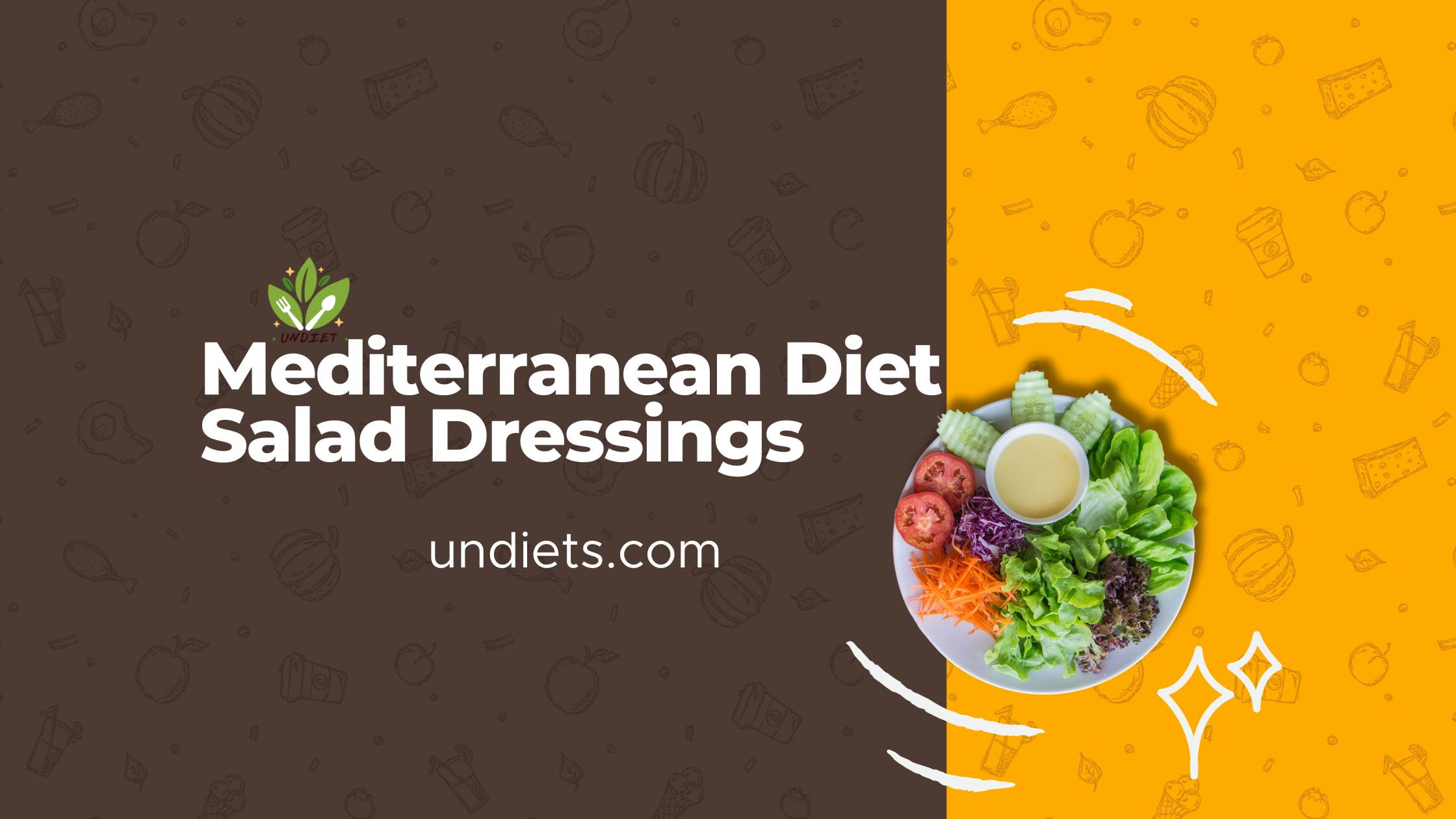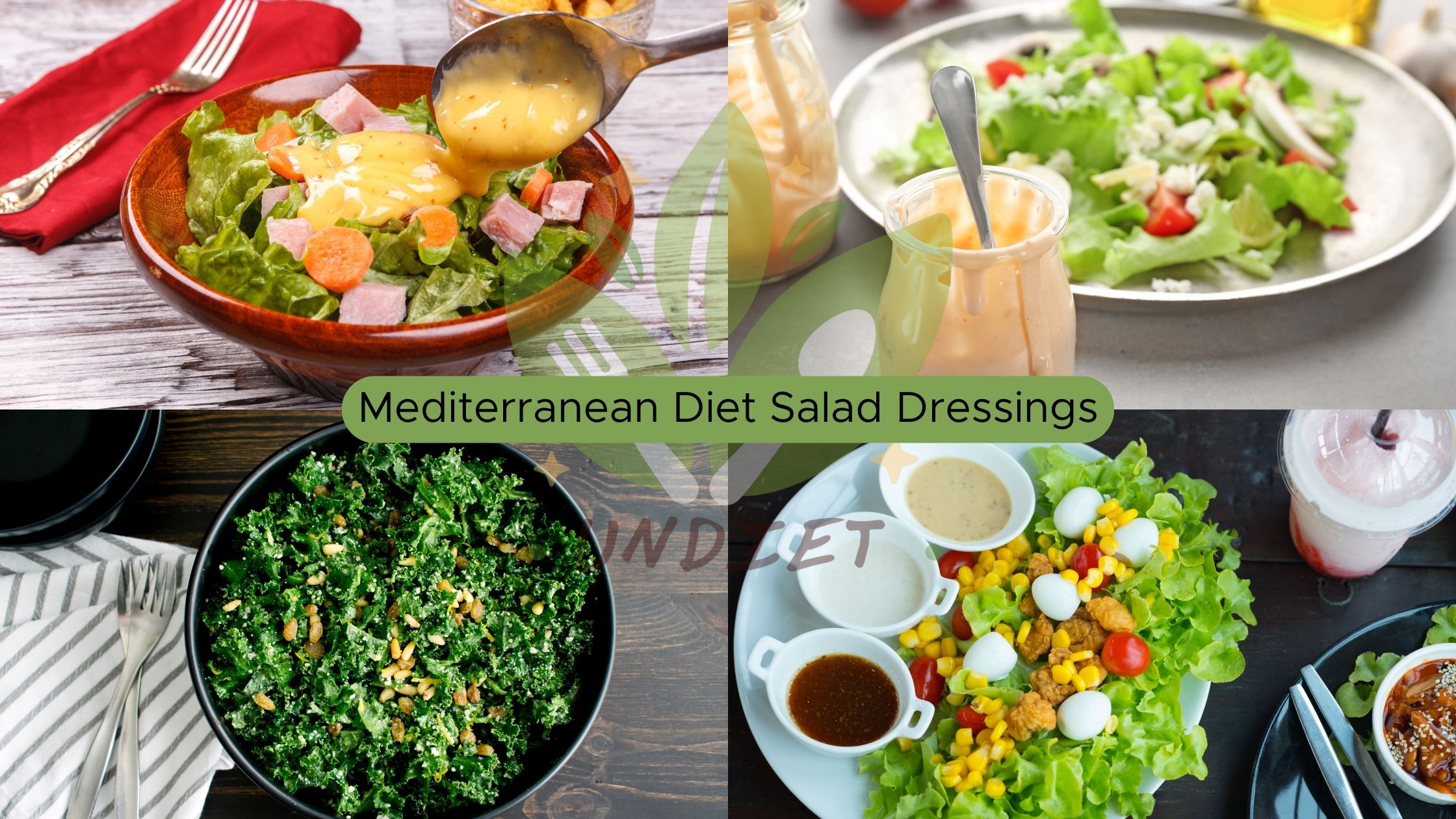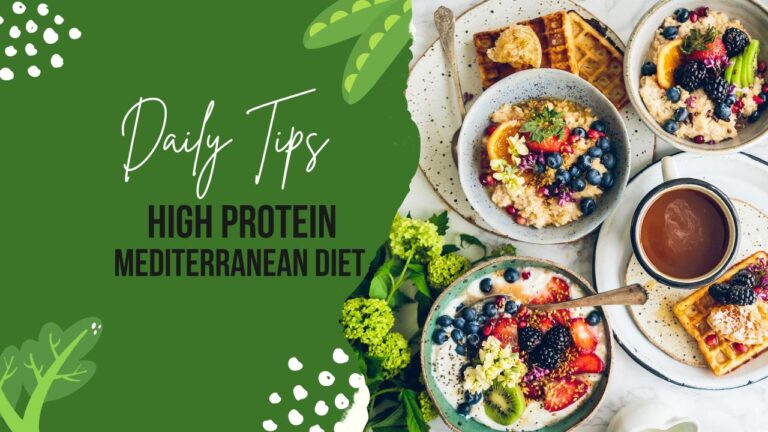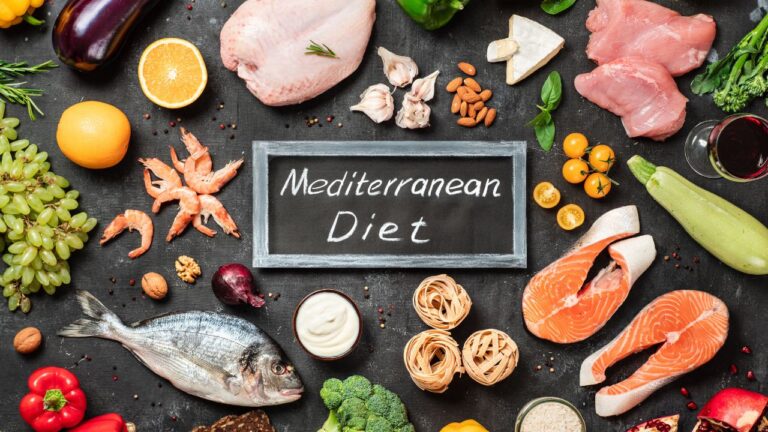Mediterranean Diet Salad Dressings: The Wholesome Recipes

Mediterranean Diet Salad Dressings is one of the foundations of the Mediterranean diet. In terms of having a nutritious salad, a decent salad dressing may make a huge difference. Salad dressings, however, are not all made equal. Unhealthy fats, sugar, and salt are prevalently high in store-bought dressings.
Salad dressings for the Mediterranean diet fit well here. Salad dressings for the Mediterranean diet are frequently made using wholesome components like olive oil, vinegar, herbs, and spices. They are flavorful and have low levels of bad fats, sugar, and salt.
But why are salad dressings for the Mediterranean diet so unique? Why are they so beneficial to you?
In this blog post, we dive deep into the art and science of Mediterranean Diet Salad Dressings. We learn the secrets of these potions that nourish your body while simultaneously teasing your taste buds, leaving you feeling energized and content. Every drop embodies centuries of history and the knowledge of ancient civilizations, from the golden appeal of extra virgin olive oil to the aromatic dance of fresh herbs. We look at traditional dishes that have been served on Mediterranean tables for decades and explore creative versions that will spark your culinary imagination.
What is the Mediterranean diet?
The Mediterranean diet is more than just a dietary plan; it’s a lifestyle that’s embraced for its amazing health benefits. The Mediterranean diet is strongly based on the culinary traditions of nations like Greece, Italy, Spain, and southern France. This diet places a high value on fresh, whole foods and is based on the eating patterns of those who reside in the Mediterranean region. It is characterized by a large intake of fresh produce, especially olive oil, whole grains, legumes, nuts, and nuts. Red meat is rarely eaten; instead, fish and poultry are enjoyed in moderation. This nutritious and well-balanced diet is the gold standard for healthy eating since it has been linked to lowered risks of cancer, heart disease, and cognitive decline.
Importance of Salad Dressings in the Mediterranean Diet
It is impossible to overestimate the importance of salad dressings in the Mediterranean diet. These sauces act as the inventive beating heart of the food, elevating plain salads to gastronomic wonders. Salad dressings made in the Mediterranean style include a variety of organic, healthy ingredients. The main ingredient in these dressings, extra virgin olive oil, not only gives them a rich, velvety texture but also contains heart-healthy monounsaturated fats. Garlic adds a strong bite, while fresh herbs like basil, oregano, and parsley give the dressings a fragrant richness. Lemons and oranges, among other citrus fruits, add a zesty brightness. Every bite of these salads is a celebration of health and flavor since the dressings not only improve the taste of the salads but also increase their nutritional worth. We will go deeper into the technique of making these dressings in this blog, looking at both traditional recipes and creative spinoffs that capture the spirit of the Mediterranean diet.
Benefits of Salad Dressings in the Mediterranean Diet
Extra Virgin Olive Oil
The key component of salad dressings for the Mediterranean diet is extra virgin olive oil (EVOO). Contrary to processed oils, EVOO is extracted without the use of chemicals, maintaining its healthful fats and natural antioxidants. EVOO, which is high in monounsaturated fats, has been linked to better cardiovascular health by balancing levels of good and bad cholesterol. Additionally, it is a rich source of polyphenols, which have anti-inflammatory qualities and strengthen the body’s defenses against a variety of ailments.
Fresh herbs & spices
Mediterranean dressings’ colorful variety of fresh herbs and spices not only enhances flavor but also the nutritious content. Herbs rich in vitamins, minerals, and antioxidants include basil, parsley, and oregano. For instance, oregano is abundant in antibacterial chemicals, while basil provides vitamin K, which is necessary for bone health. The addition of these herbs not only improves flavor but also adds a rush of nutrients that are good for your health.
Citrus Fruits
Citrus fruits, such as lemons, oranges, and grapefruits, give Mediterranean dressings a tart flavor. Citrus fruits are not only deliciously refreshing but also rich in vitamin C, a potent antioxidant essential for immunological and skin health. Additionally, they include flavonoids, which support heart health and lower the risk of chronic illnesses.
Health Benefits of Mediterranean Diet Salad Dressings
Health of the Heart
With its focus on fresh foods and olive oil, the Mediterranean diet is well known for boosting heart health. By lowering inflammation and maintaining normal cholesterol levels, the monounsaturated fats in olive oil assist in minimizing the risk of heart disease. Salad dressings from the Mediterranean diet are a heart-healthy option because they contain antioxidants from herbs and citrus fruits, which further improve cardiovascular health.
Weight Management
Due to their nutrient-rich makeup, salad dressings from the Mediterranean diet help with weight management. Healthy fats from olive oil help to satisfy hunger and reduce unwanted cravings. Additionally, salads taste better and are more filling thanks to the natural flavors of herbs and citrus fruits, which eventually help with portion management and weight maintenance.
Antioxidant Properties
The extra virgin olive oil and fresh herbs in Mediterranean diet salad dressings, in particular, include antioxidants that help the body fight against oxidative stress. Aging and certain chronic diseases are both correlated with oxidative stress. By adding these dressings to your meals, you add a wealth of antioxidants that assist in scavenging dangerous free radicals, enhancing your body’s defenses, and fostering general wellness.
Essential Ingredients in Mediterranean Diet Salad Dressings
Extra Virgin Olive Oil: Liquid Gold of the Mediterranean Diet
Unquestionably, the foundation of salad dressings for the Mediterranean diet is extra virgin olive oil (EVOO). EVOO, often known as liquid gold, is made by cold-pressing olives to preserve their inherent flavors and minerals. It includes oleocanthal, a substance with anti-inflammatory qualities, and is rich in monounsaturated fats, which support heart health. Genuine Mediterranean dressings are built on the smooth consistency and powerful flavor of EVOO, guaranteeing a tasty and healthy experience.
Citrus Zest and Juices: Adding Zing and Nutrients
Salad dressings for the Mediterranean diet have a richness of nutrients as well as a zesty brightness from citrus fruits like lemons, oranges, and limes. Citrus flavors are intensified by the zest’s abundance of essential oils, while the juice offers a crisp tang. Citrus fruits, which are high in vitamin C, strengthen the immune system, encourage the production of collagen, and work as strong antioxidants to protect the body from oxidative stress. Citrus and EVOO work together to give dressings a vibrant, well-rounded flavor profile.
Fresh Herbs and Spices: Aromatic Flavor Boosters
Salad dressings inspired by the Mediterranean diet are aromatically infused with fresh herbs and spices including basil, parsley, oregano, and thyme. These fragrant additions not only improve the flavor but also provide numerous health advantages. For instance, basil has both antimicrobial qualities and vitamin K, which is necessary for bone health. Oregano has anti-inflammatory properties and is a strong source of antioxidants. These herbs transform a straightforward salad into a culinary marvel by improving the flavor and infusing the dressing with important vitamins and minerals.
Garlic: The Pungent Superfood
Salad dressings for the Mediterranean diet get a spicy boost from garlic, which has long been valued for its therapeutic benefits. Garlic possesses powerful antibacterial and antifungal qualities because it is high in allicin, a sulfur-containing molecule with significant health advantages. By lowering blood pressure and cholesterol levels, it also promotes heart health. Garlic’s distinctive aroma and flavor are released when it is minced or crushed, giving the dressing a strong, savory flavor that goes well with the other components’ freshness.
Vinegar: Balsamic, Red Wine, and Apple Cider Varieties
The key ingredients in salad dressings for the Mediterranean diet are vinegar, particularly balsamic, red wine, and apple cider variations. A perfectly aged balsamic vinegar has a sweet and tart flavor profile that balances the richness of EVOO. Red wine vinegar adds a light acidity, increasing the dressing’s overall flavor. A slightly fruity aroma is added by apple cider vinegar, which is well known for its potential health advantages. These vinegar are crucial ingredients in crafting well-rounded and tasty Mediterranean salads since they not only give the dressing complexity but also provide special health-promoting chemicals.
Classic Mediterranean Diet Salad Dressing Recipes

Traditional Greek Salad Dressing
Ingredients and quantities:
- 1/4 cup red wine vinegar – 1/2 cup extra virgin olive oil
- 1 minced garlic clove
- 1 tsp. dried oregano
- To taste, salt and black pepper
Preparation Steps:
- Mix the red wine vinegar and olive oil thoroughly in a small basin.
- Include black pepper, salt, dried oregano, and chopped garlic. To make the dressing emulsify, whisk ferociously.
- To let the flavors mingle, let the dressing sit for at least 15 minutes.
Serving Recommendations:
This traditional Greek salad dressing is ideal for pouring over a Greek salad made with feta cheese, Kalamata olives, fresh cucumbers, tomatoes, red onions, and Kalamata olives. It can also be used as a marinade to flavor poultry or vegetables that have been grilled with Mediterranean spices.
Italian Balsamic Vinaigrette
Ingredients and quantities:
- 1 clove of minced garlic
- 1/3 cup extra virgin olive oil
- 2 tablespoons balsamic vinegar
- 1 teaspoon Dijon mustard
- To taste, add salt and freshly ground black pepper.
Steps in Preparation:
- Combine balsamic vinegar and Dijon mustard in a mixing dish.
- Whisk continually as you slowly sprinkle in the olive oil to produce an emulsion.
- Include salt, black pepper, and minced garlic. Stir thoroughly until combined.
Serving Recommendations:
With mixed greens, cherry tomatoes, fresh mozzarella, pine nuts, and Italian balsamic vinaigrette. Additionally, it makes a fantastic dressing for pasta salads or grilled seafood, giving the food a lovely acidic sweetness.
Lemon-Herb Dressing
Ingredients and quantities:
- 1/8 cup extra virgin olive oil
- 1 lemon’s zest and juice
- 1 tablespoon finely chopped fresh basil
- 1 tablespoon finely chopped fresh parsley
- To taste, add salt and freshly ground black pepper.
Steps in Preparation:
- Combine lemon juice, zest, and olive oil in a small bowl. Up until a smooth mix, whisk.
- Add parsley and basil, both cut finely. The herbs should be well mixed into the dressing.
- Adjust seasoning with salt and black pepper to taste.
Serving Recommendations:
Drizzle the tangy lemon-herb dressing over grilled vegetables or a straightforward garden salad for a delicious touch. Additionally, it gives roasted chicken or quinoa-based recipes a light touch. In addition, it can be used as a dipping sauce on crusty bread to bring out the citrus and herb flavors.
Creative Variations of Mediterranean Diet Salad Dressings
Yogurt Dressing from the Mediterranean
Ingredients and quantities:
- Half a cup of Greek yogurt
- 2 tablespoons of extra virgin olive oil and 1 minced clove of garlic
- 1 tablespoon lemon juice, fresh
- one teaspoon of dried dill
- To taste, salt and black pepper
Steps in Preparation:
- Combine Greek yogurt, olive oil, minced garlic, and fresh lemon juice in a mixing bowl.
- Include salt, black pepper, and dried dill. Until the ingredients are thoroughly combined and the dressing is smooth whisk.
- To enable the flavors to mingle, place in the refrigerator at least 30 minutes before serving.
Serving Recommendations:
For serving over fresh Romaine lettuce, cherry tomatoes, cucumber slices, and Kalamata olives, use this creamy Mediterranean yogurt dressing. To add a delightfully tangy touch to the dinner, it can also be used as a cool dip for vegetable crudités or served alongside grilled chicken or fish.
Dressing with honey-mustard and citrus
Ingredients and quantities:
- 2 tablespoons fresh orange juice
- 3 tablespoons extra virgin olive oil
- 1 teaspoon of lemon zest
- 1 tablespoon of Dijon mustard
- 1 tablespoon of honey
- Salt and freshly ground black pepper, to taste
Steps in Preparation:
- In a small bowl, stir together the olive oil, honey, Dijon mustard, and fresh orange juice.
- Include salt, black pepper, and lemon zest. A smooth, velvety dressing can be made by vigorously whisking.
Serving Recommendations:
Salads made of mixed greens, roasted beets, goat cheese, and candied walnuts are given a taste boost by the honey-mustard citrus dressing. It also works well as a marinade for grilled shrimp or tofu, giving them a sweet and sour flavor. To provide a distinctive touch and bring out the fruits’ inherent richness, drizzle it over fruit salads.
Mediterranean dressing with a kick
Ingredients and quantities:
- 2 teaspoons red wine vinegar
- 1/4 cup extra virgin olive oil
- 1 teaspoon harissa paste (adjust the amount of spice to taste)
- 1 minced garlic clove
- One teaspoon of honey
- To taste, add salt and freshly ground black pepper.
Steps in Preparation:
- Combine the harissa paste, red wine vinegar, extra virgin olive oil, minced garlic, and honey in a bowl.
- Add black pepper and salt to taste. Depending on the level of heat you desire, alter the amount of harissa paste in the dressing. Whisk the mixture until it has a uniform texture.
Serving Recommendations:
With arugula, grilled veggies, feta cheese, and olives, this spicily flavored Mediterranean dressing is the perfect complement to hearty salads. Additionally, it enhances couscous or quinoa salads by giving a hot kick when drizzled over them. Use it as a dipping sauce over warm pita bread to create a distinctive appetizer that elevates a straightforward nibble to a mouthwatering Mediterranean experience.
Tips for Making Mediterranean Diet Salad Dressings
Emulsification: Obtaining the Ideal Consistency
For a smooth, well-blended texture, salad dressings from the Mediterranean diet must be emulsified. Start by slowly mixing the oil and acid components while whisking ferociously. The emulsification process is frequently aided by incorporating materials at room temperature. When using a jar, shut the lid firmly and shake the contents until it is uniformly creamy. Every bite offers a delicious and consistent flavor thanks to emulsification, which makes sure that the tastes blend flawlessly.
Guidelines for Refrigeration
Salad dressings from the Mediterranean diet, especially those with fresh components like citrus and garlic, should be promptly refrigerated to keep them fresh. To avoid oxidation caused by exposure to air, store them in airtight containers. Dressings can be kept in the refrigerator for one to two weeks while maintaining their flavor and nutritional content.
Shelf Life and Spoilage Symptoms
Even though homemade dressings don’t contain any preservatives, their shelf life is very short. Keep an eye out for spoiled food indicators, such as bad flavors, consistency or color changes, or the development of mold. To avoid eating rotten food, it is preferable to throw away the dressing if any of these are found. Make dressings in smaller batches to ensure you can consume them at their freshest while extending shelf life.
Using Different Salads with Different Dressings in the Mediterranean Diet
The versatility of Mediterranean diet salad dressings is one of their defining characteristics. Try experimenting with various herbs, spices, and citrus fruits to develop distinctive flavors suited to particular salads. Consider enhancing the dressing for a fruit-based salad by including a little honey or pomegranate molasses. Use fresh dill and a touch of mustard to add depth to a seafood salad. By customizing dressings, you may explore the complete range of Mediterranean flavors and pair them with a variety of salads, turning each salad into a new gourmet experience. Don’t be afraid to experiment to find your distinctive dressing that goes nicely with your favorite recipes that have a Mediterranean influence.
Conclusion about Mediterranean Diet Salad Dressings
In conclusion, salad dressings from the Mediterranean diet serve as vivacious examples of the diverse range of flavors and health advantages present in this renowned culinary tradition. These dressings not only enhance the flavor of salads but also provide them with a wide range of important nutrients and antioxidants. These dressings range from the heart-healthy hug of extra virgin olive oil to the aromatic dance of fresh herbs and the zesty brightness of citrus. They stand as an example of the Mediterranean lifestyle, where food is not just a source of nourishment but also a celebration of health, community, and a strong bond with the land.
Readers are encouraged to Experiment and Produce Their Variations
We urge you to embrace the spirit of experimentation as you begin your gastronomic journey motivated by the Mediterranean diet. To make your special salad dressings, experiment with different combinations, tweak the components, and change the ratios. Discover the flavors that most appeal to your palate by letting your taste buds be your guide. The appeal of the Mediterranean diet is in its adaptability, which invites you to alter dishes to suit your tastes, making each meal a wonderful and rewarding experience that is specially created for you.
Share Your Thoughts and Recipes in the Comments Section
In the section below, we invite you, our readers, to contribute your stories, suggestions, and recipes for your very own Mediterranean diet salad dressings. Your ideas and innovations not only benefit the culinary world but also encourage others to go on their savory adventures. Let’s create a community where we can collaborate, share ideas, and learn from one another while creating a bond around our shared love of wholesome, delectable, and healthy Mediterranean food.
We appreciate your participation as we investigate salad dressings for the Mediterranean diet. May your salads always be flavorful, your dinners always be filling, and your culinary explorations never end. Cheers to being healthy and enjoying life to the fullest, one delicious salad at a time!
Frequently Asked Questions about Mediterranean Diet Salad Dressings
What makes Mediterranean diet salad dressings healthier than regular dressings?
Extra virgin olive oil, which is high in monounsaturated fats, antioxidants, and anti-inflammatory qualities, is the base used in salad dressings associated with the Mediterranean diet. These dressings frequently include citrus fruits and fresh herbs, which add important vitamins and minerals. Mediterranean dressings provide a more wholesome, nutrient-dense substitute for some commercial dressings that are rich in processed fats and carbohydrates.
Can Mediterranean diet salad dressings help with weight loss?
They can, yes. Healthy ingredients are frequently used in Mediterranean diet salad dressings, which enhances the flavor and satiation of salads. People are more inclined to include salads in their meals when they love them, which can help reduce calorie and portion intake. Furthermore, the beneficial fats in these dressings give you a feeling of fullness, which helps you control your appetite.
Are Mediterranean diet salad dressings suitable for vegetarians and vegans?
Absolutely. The majority of salad dressings for the Mediterranean diet are made with plant-based components, making them naturally vegetarian and vegan-friendly. The main ingredients in these dressings are olive oil, herbs, spices, and citrus fruits, making them completely compatible with vegetarian and vegan diets.
How can I use Mediterranean diet salad dressings creatively in my cooking?
Salad dressings for the Mediterranean diet are highly adaptable. You can use them as marinades for grilled vegetables, meats, or tofu in addition to drizzling them over salads. They can also be added to pasta salads or used as savory dipping sauces for bread. You can explore by putting them in cereal bowls, wraps, or even as the foundation for your own homemade pizza sauce.
Are there any specific health benefits associated with the ingredients in Mediterranean diet salad dressings?
There are, indeed. Due to its monounsaturated fats and antioxidants, extra virgin olive oil is widely known for boosting heart health. Garlic has antibacterial qualities, while fresh herbs like basil and oregano are rich in vitamins and minerals. Citrus fruits have immune-boosting properties because they are high in vitamin C and flavonoids. These components deliver a strong blend of nutrients and antioxidants when combined, boosting numerous health aspects.
Can I store Mediterranean diet salad dressings for an extended period?
Homemade dressings don’t contain any preservatives, yet they can be kept in the fridge for one to two weeks. Store them in sealed containers and give them a thorough shake before using them to keep them fresh. To make sure you’re consuming the dressing at its best, it’s better to toss it if you detect any changes in scent, color, or consistency.






